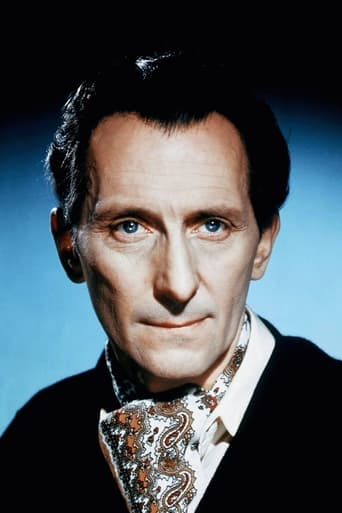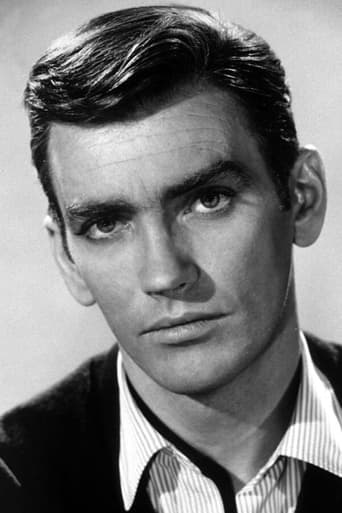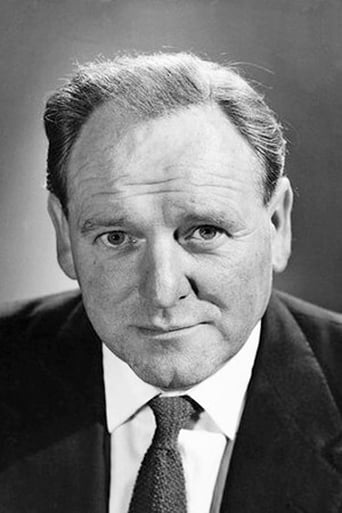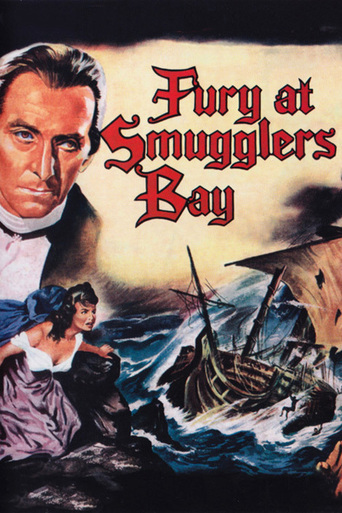
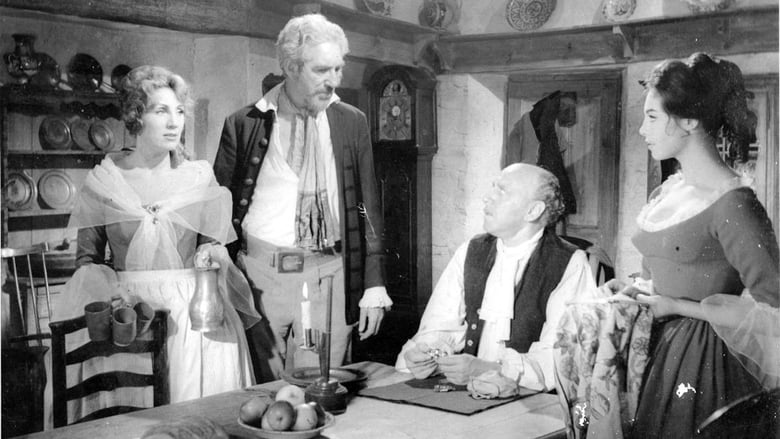
Fury at Smugglers' Bay (1961)
It is the end of the 18th century and smuggling is considered to be a legitimate spare-time occupation for most fishermen around the British shores. But when a gang of cut-throats, led by the infamous Black John (Bernard Lee) begins to lure ships onto the rocks of Smugglers Bay, and murdering their crews for the sake of loot, the fishermen begin to fear for their livelihoods. In desperation, they appeal to the local magistrate Squire Trevenyan (Peter Cushing).
Watch Trailer
Cast
Reviews
Save your money for something good and enjoyable
Strong acting helps the film overcome an uncertain premise and create characters that hold our attention absolutely.
It's a feast for the eyes. But what really makes this dramedy work is the acting.
All of these films share one commonality, that being a kind of emotional center that humanizes a cast of monsters.
This entertaining adventure drama about smuggling in late 18th century is somehow betrayed by its low budget, more evident in the ship wrecking scenes, under furious storms. It tells the story of a British coastal town laden with taxes, where almost everybody has turn to smuggling to make ends meet. The action never stops with good rhythm and precise dialogue, and the enjoyment is evident in the actors' faces. All the cast is very effective, with Peter Cushing as a magistrate with a secret that haunts him, Bernard Lee as the villain before playing M to Sean Connery's James Bond, John Fraser as a dashing young swordsman and William Franklyn as a highwayman that becomes a hero. With pretty Michèle Mercier as the love interest, June Thorburn as Cushing's daughter and Liz Fraser in one of her best early roles as waitress-spy, this is one of John Gilling's best contributions to period drama.
1960's "Fury at Smugglers' Bay" was among eight consecutive non horror roles essayed by Peter Cushing in the early 60s, but despite his top billing gets upstaged rather easily by several combative co-stars. Squire Trevenyan (Cushing) rules over a small seaside community in 1789 Cornwall (filmed near Fishguard Wales), seeking to discourage his son's romance with the pretty daughter of law abiding smuggler Francois Lejeune (George Coulouris), while ineffectually dealing with the treacherous Black John (Bernard Lee) and his band of pirate wreckers, luring passing ships to destruction before looting the goods for evil profit. Added to the mix is a rogue highwayman known only as 'The Captain' (William Franklyn), who seems to be in cahoots with Black John, but does what he can to help the persecuted Lejeune. Bernard Lee, recently a heroic pilot opposite Cushing in "Cone of Silence," relishes being cast against type, while the always welcome presence of Hollywood veteran George Coulouris demonstrates how the citizens tried to fight back against the King's malign taxation. Michele Mercier is well known to horror fans for her starring efforts in two Italian titles, 1963's "Black Sabbath" and 1970's "Web of the Spider," with Hammer veteran Miles Malleson granted only one short scene as the Duke of Avon. Peter Cushing enjoyed making this exciting 'British Western,' but his character's strained relationships with both of his children keeps the puzzled audience at a distance, whereas his next Hammer, "Night Creatures" aka "Captain Clegg" would offer him a far more challenging, and thus rewarding, swashbuckling adventure, played with more gusto and a twinkle in the eye. In the future, he would again work with both Bernard Lee ("Frankenstein and the Monster from Hell") and William Franklyn ("The Satanic Rites of Dracula").
Fury at Smugglers' Bay is directed, produced and written by John Gilling. It stars Peter Cushing, Bernard Lee, John Fraser, Michèle Mercier, William Franklyn and George Coulouris. Out of Regal Films International with music scored by Harold Geller and Eastman Color/Panascope photography by Harry Waxman.18th century England on the Cornish coast and a fearsome band of Wreckers are luring ships on to the rocks so as to plunder the cargo.There was a mini pirate/smuggler/swashbuckler based film revival in early 60s Britain, John Gilling was a key player in that revival. Sadly this, one of the first to show its face, is a mundane and schizophrenic piece. The story is safe enough, where a village indulges in "light" smuggling but come under threat by "big boy baddies" who prefer to cause carnage as well. Into the mix comes hidden secrets, forbidden passions and kidnap. It should be a recipe for good period costume malarkey, but Gilling, who was capable of excellent work (see The Flesh & the Fiends/The Reptile), provides a poor script and unimaginative direction. It's also sad to see the great Peter Cushing turn in a half hearted performance, but again much of that can be attributed to the script that fails to give his character any meaty purpose, with the big "secret" at the core of plotting about as weak as it gets.Irritation is further compounded by the look and sound of the picture. For interiors we do get good period flavours, with the costumes (Phyllis Dalton) and colour lensing feeling authentic, but once the picture goes outside, which is for most of the run time, it loses the feel. The day for night blueness for night sequences dulls the viewing and Waxman's photography around the locale, which is not Cornwall but Abereiddy in Wales, sadly looks like it's 1960 and not 1789. Waxman (Twisted Nerve/The Wicker Man) was a very good cinematographer, but his work here represents a big fail. The editing (John Victor-Smith) is off, where characters sort of mill about in the narrative without achieving anything, and Geller doesn't know if he is scoring a comedy or a period drama!There's some value in watching a pre-James Bond franchise Bernard Lee belching and brooding, while the finale is certainly rousing enough. Yet it looks and plays cheap, something that the similar genre films out of Hammer Productions didn't suffer from, this in spite of the same budget restrictions. It's noted that the original cut of the film was around 92 minutes, where now it runs at just 82. The missing 10 minutes may have helped the flow of the story, but it's highly doubtful it would improve the film as a whole. 5/10
Writer/producer/director John Gilling's story is set in 17th-century Cornwall when fishermen were hit by heavy taxes and turned to smuggling in order to supplement their income. Here, the village squire Trevenyan (Peter Cushing) puts together an army in order to wipe out smuggling from his community. However, the town is terrorised by a group of cut-throats lead by Black John (Bernard Lee) who force ships to land at Smugglers Bay and then ruthlessly murders their crews for the sake of their cargo. Unfortunately, Black John has a hold over Trevenyan and as a result, poor fisherman Francois Lejeune (George Coulouris) is charged for the shipwrecking as well as the smuggling he has done and is to be deported to a foreign colony. The squire's son Christopher (John Fraser) is in love with Lejeune's daughter Louise (Michele Mercier) and teams up with local highwayman known simply as the Captain (William Franklyn) in order to run Black John out of town and to prevent Lejeune's deportation.All in all, FURY AT SMUGGLERS' BAY, is well enough done and entertaining enough while its on. I mean who could resist a film with such interesting credits. Bernard Lee as Black John who was soon to become famous as "M" in the Bond series, Peter Cushing as Squire Trevenyan and William Franklyn as the Captain. In addition, there's one of Britain's best known cameramen Harry Waxman behind the camera and John Gilling (an interesting British director who made such classics as THE PLAGUE OF THE ZOMBIES and THE VOICE OF MERRILL) is on hand to direct. Yet somehow after one's seen the film, the next morning there's nothing to remember.
